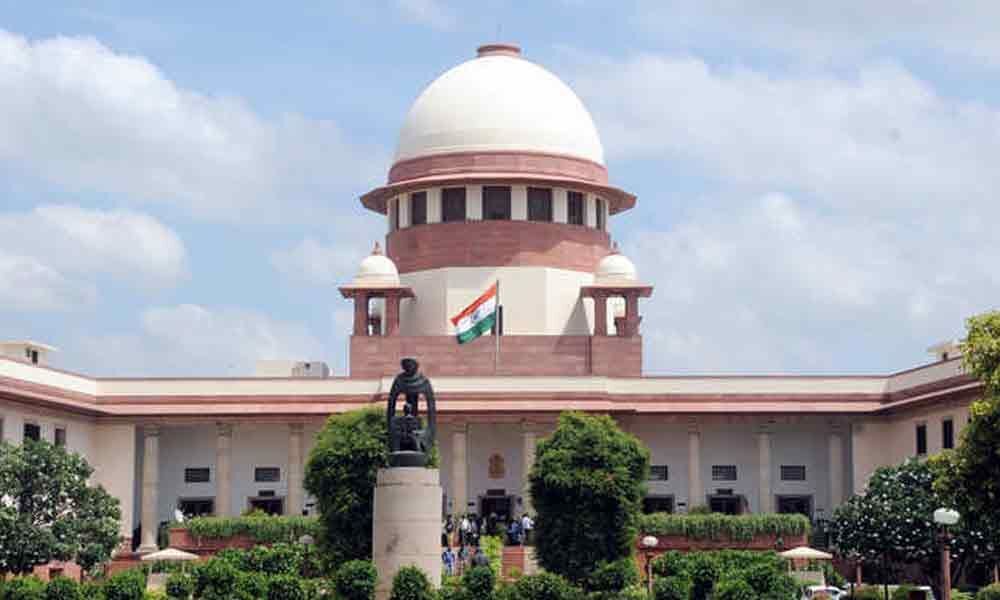Live
- IND vs AUS Boxing Day Test 2024: Sam Konstas Debuts, Travis Head’s Fitness in Question
- Congress Challenges Election Rule Amendments In Supreme Court
- Jaishankar’s US Visit: Key Diplomatic Engagement Amid Leadership Transition
- Orthodox Church Bishop Criticizes PM Modi’s Christmas Celebration Participation
- Janhvi style & grace takes centre stage
- Allu Arjun’s Pushpa 2 Becomes First Hindi-Dubbed Film to Cross Rs 700 Crore
- ‘Legally Veer’ pre-release event creates buzz
- ‘Chinni’ from ‘Daaku Maharaaj’ that strikes a chord with audience
- A raw and intense love story ‘Premikudu’ set to captivate audiences
- Apple iPhone 15 Now Available for Rs 26,999 on Flipkart – Grab the Deal Today!
Just In
Supreme Court to hear, decide sensitive cases like Ayodhya, Rafale on reopening


Upon reopening on July 1 after six-week summer vacation, Supreme Court will deal with very sensitive issues, including Ayodhya, Rafale case.
New Delhi: Upon reopening on July 1 after a six-week summer vacation, the Supreme Court will deal with very sensitive issues, including the Ayodhya land dispute, review pleas in Rafale case and the contempt case against Rahul Gandhi for wrongly attributing to the court his "chowkidar chor hai" slogan.
The top court, which would function with its full judicial strength of 31 judges under the stewardship of Chief Justice (CJI) Ranjan Gogoi, is likely to deliver its verdict in the review pleas in Rafale case.
The petitions, including the one filed by ex-Union ministers Yashwant Sinha and Arun Shourie, and lawyer Prashant Bhushan, seek review of the apex court's December 14, 2018, judgment dismissing all pleas challenging procurement of 36 Rafale fighter jets from France.
Also, a three-judge bench headed by the CJI would decide the fate of BJP MP Meenakshi Lekhi's contempt plea against Gandhi for wrongly attributing to the top court his "chowkidar chor hai" jibe against Prime Minister Narendra Modi.
Gandhi, however, has already tendered unconditional apology for it and sought closure of the case. The outcome of the in-camera mediation proceedings, undertaken by a three-member panel headed by former apex court judge Justice F M I Kallifulla, to find an amicable solution to the politically-sensitive Ram Janmabhoomi-Babri Masjid land dispute, would be watched with bated breath.
The mediation committee, which also comprises spiritual guru Sri Sri Ravishankar and senior advocate Sriram Panchu, is "optimistic" about finding an amicable solution to the vexatious dispute. It has been granted time till August 15 by a five-judge bench headed by the CJI.
Fourteen appeals have been filed in the SC against the 2010 Allahabad High Court judgment, delivered in four civil suits, that the 2.77-acre land in Ayodhya be divided equally among three parties – the Sunni Waqf Board, the Nirmohi Akhara and Ram Lalla.
Besides these, the SC will have to deal with a PIL seeking a probe and lodging of an FIR against activist lawyers Indira Jaising, Anand Grover and their NGO 'Lawyers Collective' for allegedly violating rules relating to receipt and utilisation of foreign funds.
The PIL has been filed by 'Lawyers' Voice', a voluntary organisation of advocates. The top court would also dealing with the PIL of lawyer and BJP leader Ashwini Upadhyay challenging the constitutional validity of Article 370, which grants special status to Jammu and Kashmir and limits Parliament's power to make laws for the state.
The top court would also be dealing a host of pleas challenging the constitutional validity of Article 35A, which provides special rights and privileges to natives of Jammu and Kashmir.
On February 11, the Jammu and Kashmir government had sought permission from the Supreme Court to circulate a letter to parties for adjourning the hearing on pleas saying that there was no "elected government" in the state.

© 2024 Hyderabad Media House Limited/The Hans India. All rights reserved. Powered by hocalwire.com






